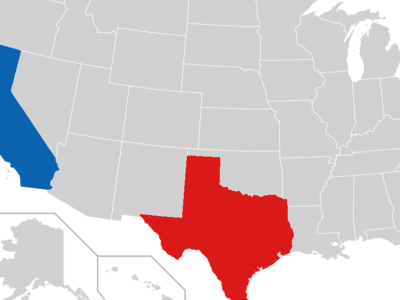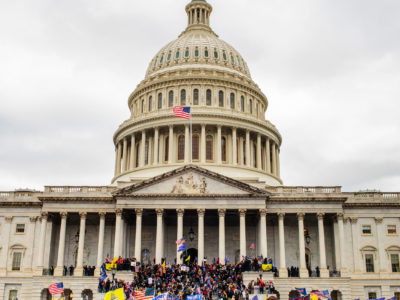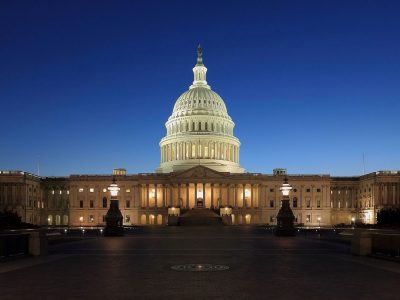environmental politics
Why is EPA “Faceless”?
People complain about faceless bureaucrats. At least in part, that could be fixed.
How many people can name the head of EPA or even know the title of that office? About 5% of the population, would be my guess. Apart from Scott Pruitt, who became famous for his $20,000 phone booth, few people outside of the field could name any previous holder of the office.
CONTINUE READINGTexas and California Are Not Opposites. Contrary to What You Might Think.
These two states are often portrayed as epitomizing two possible futures. But the differences are more nuanced than you think.
here’s a common idea that Texas and California represent two opposing poles of America. They’re admittedly very different places on many dimensions. But in some respects, they are surprisingly similar, and some differences aren’t as big as they seem.
CONTINUE READINGWith 4 Weeks Left, the Election – and the Future of Climate Policy – Hang in the Balance
The White House and control of the House remain toss-ups.
Yhe outcome of the 2024 election will be pivotal for climate and energy policy. With a month to go, things are still incredibly close. Harris has a tiny edge in the electoral college and the Republicans have similar edges in the House and Senate.So hang onto your hats for the final stretch of this rollercoaster ride. A last-minute “October surprise” is still possible, and it’s also possible that polls will turn out wrong.
CONTINUE READINGThe Two Races Most Likely to Determine Control of the Senate
The outcomes will shape environmental policy in the new Congress.
To keep control of the Senate, Democrats must hold on to the White House and two Senate seats in red states. If Republicans win in Ohio or Montana, they are virtually guaranteed to flip the Senate, with important consequences for environmental policy.
CONTINUE READINGEvolving Energy Positions, 2016-2024
The national debate over climate and energy has shifted since Trump’s first run in 2016.
Coal, once a political flash point, has almost disappeared as an issue, with oil and gas production in unchallenged first place for Republicans. Clean energy subsidies, a side-issue in 2016,, have now taken center stage, while EPA regulations get much less attention. The one thing that remains unchanged is the gulf between the parties.
CONTINUE READINGThe Contract with America
Or, as some critics called it, “the Contract ON America.”
The Contract with America was the brainchild of Newt Gingrich. It was a turning point in American politics: moving the GOP from compromise to confrontation, nationalizing what had previously been locally oriented House races, and shifting the GOP far to the right. There’s a reason they call Gingrich the man who broke Congress.
CONTINUE READINGThe Battle for Congress: Key U.S. House Races in California
These elections could prove critically important to how much the next President can reshape energy and environmental policy.
These are key races for control of the House: if they did all flip and Democrats held their remaining seats, Hakeem Jeffries would be the next Speaker. The battle for control of the U.S. House is going to be very tight. Democrats need to pick up only four seats to flip control – something that will be especially important for them if Trump wins and Republicans win the Senate as expected. Especially in that scenario, control of the House will have a big impact on climate and energy policy, one way or the other. It doesn’t look like climate or energy are major issues in the key U.S. House races in California. Only one candidate (Dave Min) devotes significant attention to them. To avoid unintentionally distorting anyone’s views, these descriptions are taken straight from their campaign websites.
CONTINUE READINGThe State of the Race
Who will shape federal climate and energy policies? The answer remains too close to call.
Republicans are favored to take control of the Senate, but who will control the House and the Presidency remains too close to call. The implications for climate policy and the future of the planet could be profound.
CONTINUE READINGWhy the 2024 House Races Matter So Much for Energy and Climate Policy
Those races get a lot less attention than elections for the Senate, but they’re equally important.
Unified government would give Trump a much freer hand. Republicans are likely to win the Senate. If they also win the House, he wouldn’t have to worry about annoying congressional investigations and could use the Senate reconciliation procedure to gut environmental agencies and federal support for clean energy.
CONTINUE READINGShould We Be Upset If Candidates Don’t Provide Concrete Policy Plans?
Policy specifics give me something to write blog posts about. But how much should they matter to voters?
After all, you don’t need specifics to know that Trump and Harris have very different views about climate and energy. Should voters care about their failure to go into detail?
CONTINUE READING








